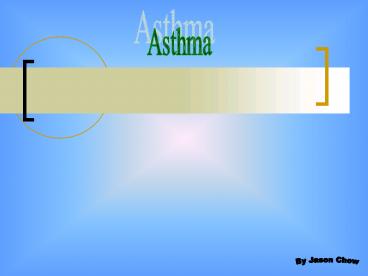Asthma PowerPoint PPT Presentation
1 / 11
Title: Asthma
1
Asthma
By Jason Chow
2
Agenda
- What is Asthma?
- Risk Factors
- Whos at Risk?
- Types of Asthma
- Causes of Asthma Attacks
- Prevention
- Health Management
- Help
- Bibliography and Links
3
What is Asthma?
- A common condition which involves a difficulty
in breathing - Asthma effects a part of the human population
and even some animals - Wheezing, coughing, and a tight feeling in the
chest are signs of asthma - Cannot be cured only controlled by drugs
- Many people, untreated, die from this disease.
4
Risk Factors
- Attacks range from mild to life threatening. If
untreated it may lead to death
- Asthma attacks can be triggered anywhere and
anytime
- Difficulty of breathing and spasmodic coughing
5
Who's at Risk?
- Bronchial Asthma is found in 3-5 of adults and
7-10 of children. - People at the age of 20 living in the urban
areas tend to have asthma - Anyone could have this disease including those
with family history of eczema and asthma
- Children are usually born with this disease but
later outgrow it
6
Types of Asthma
- Nocturnal Asthma occurs usually in the middle of
the night between 2AM-4AM
- Allergic reactions can cause asthma attacks.
- There are 5 types of asthma Allergic,
Non-Allergic, Seasonal, Exercise-induced, and
Nocturnal Asthma
- Non-Allergic asthma attacks are caused by
pollution in the air.
- Exercise-induced attacks are triggered when
patients with asthma exercise too hard.
- Seasonal Asthma is triggered by the trees,
flowers or grasses in the different seasons
7
Causes of Asthma Attacks
- Emotional stress can cause an attack
- Overdoing regular exercises may lead to
shortness of breath
- Two chemicals are released when an attack is
triggered Histamine and Acetyl Choline.
- These chemical causes the bronchial muscles to
contract
- Histamine is the most frequently released
because it is triggered by an allergic reaction
8
Prevention
- By avoiding known allergies patients can
greatly increase the prevention of attacks
- Exposure to smoke, pollution, etc. should also
be avoided
- Inhaling drugs like aminophylline or
theophylline should prevent some painful attacks
for awhile
9
Health Management
- Do not drink beer or wine or eat food like
shrimp, dried fruits, and other foods that cause
asthma symptoms
- Warm up before exercising and cool down after.
Cooling down allows your lungs to adjust to the
temperature differences
- Never overdo daily exercises because it may
prove too great of a challenge and an attack may
occur
- Exercise daily with an activity that you best
like. This prevents you from boredom and quitting.
- Drink adequate liquids and eat well-balanced
meals. Junk food only worsens the condition
10
Help
- Asking a doctor about this condition is a great
way to learn how to manage this disease
- Contact a healthcare professional to start an
exercise plan best for you
- Getting to people to understand a patients
condition may help
- Dont be afraid to ask questions about this
condition to a doctor
- Make sure a loved one has an Asthma Action
Plan. Familiarize with it so you know exactly
what to do
11
Bibliography and Links
Anne Hildyardl. The Marshall Cavendish
Encyclopedia of Health. 99 White Plains Road
Marshall Cavendish Corporation, 2003 Pam Walker.
The Respiratory System. Farmington Hills, ML
Thomson Learning, 2003
http//wicca.hit.bg/Live/asthmaY.htm http//google
.ca http//asthma.com

